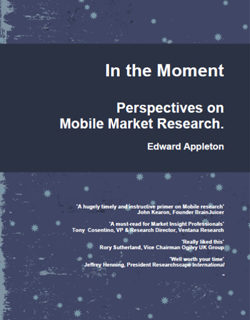Lucy Davison
A few weeks ago I attended a lecture “Robot reporters – journalism in the age of automation and big data”, given by Emily Bell (media journalist and director of Digital Journalism at the University of Columbia). Bell was talking about the future of journalism, but much of what she said applied to market research (as it so often does with journalism and research, but that’s another article).
Imagine a news story written and published within three minutes of the event happening – and barely involving a human being. According to Bell that’s how journalism increasingly is done these days. What is more, experts suggest that by 2030 “90% of all news stories will be written by computer”.
The lead story in the Los Angeles Times a week before Bell’s lecture had been “written” by Quakebot, (who has a Twitter following of more than 60,000). Quakebot is a programme developed by a Los Angeles Times journalist. It takes scans from automated earthquake alerts from the US Geological Survey, pulls the data into a pre-written template and puts it in the Los Angeles Times database, where it is available for journalists to review, or just push a button and publish. The story was very precisely written (and rather dull for that), but the principle applies – the journalist who wrote Quakebot and whose by-line the story appeared under (described as “journalist and programmer”) was woken by an earthquake, went to his computer, saw the story already written and waiting, and pressed the “publish” button. It all took about three minutes—far faster than any human could have spotted the information, assimilated it, and written it up.
That’s just one example. There are several phenomenally successful businesses producing stories for newspapers using algorithms such as Narrative Science. Tech crunch is producing the News for Facebook’s new news service, launched last month – they also have algorithms doing layouts and design. Google news is based on an algorithm. Experts at Cornell Tech Campus are writing a programme that will synthesise social media streams and geo-location service with an algorithm to incorporate context and images in order to feed news feeds.
Bell also cited GameChanger. This last one is very interesting, it demonstrates how algorithms can be biased. It is much harder to find out about bias with an algorithm than it is with human writers, and often the code is commercially confidential—as it is with the Googles and Facebooks of the world. GameChanger started out writing news reports based on kids’ baseball, softball and basketball teams in the US. Originally the algorithm was done in the same way as sports news for adults, with a hard edge about how one player slipped up or a team was decimated. But this negative angle proved unpalatable to the little-league moms, so the algorithm was rewritten to provide a positive spin on the stories emphasising the wins, not the losses.
Perhaps even more mind-blowing is the potential impact of drones – rather than chasing news stories in dangerous areas, soon you’ll be able to print out a drone that will send you a crystal clear bird’s eye view of any incident a news desk might want to report on. You won’t even have to tell it to go. It will just be there. It will have responded to the same social evidence that you have.
Where does all this leave researchers, let alone journalists? According to a new paper by Carl Benedikt Frey and Michael A. Osborne, discussed recently in The Economist, 47% of today’s jobs could be automated in the next two decades. But don’t imagine it’s just the boring ‘grunt’ jobs that will go. Robots are already creeping into diagnostics and surgeries. Schools are experimenting with software that replaces teaching. As Frey and Osborne write in their report conclusion:
“While computerisation has been historically confined to routine tasks involving explicit rule-based activities, algorithms for big data are now rapidly entering domains reliant upon pattern recognition and can readily substitute for labour in a wide range of non-routine cognitive tasks … This is likely to change the nature of work across industries and occupations”
At the BIG/CPS Conference last month, Michael Jackson from Shaping Tomorrow said that market research was predicted to be one of the careers most impacted by automation in future with a vast number of the more junior roles being replaced by machine.
So, what can we do? Over the last few years the market research industry has been increasingly commoditised with the price of data being ceaselessly driven down. Agencies have traditionally used a business model whereby they make money selling the data, but do not charge for the added value consultancy and analysis. In a world where data is cheap and increasingly free, and where even cognitive tasks can be replaced by algorithms, this model is bust.
We don’t just need to take control and write (or bias) the algorithms, we also need to behave as true consultants; charging for expertise by results. To do that we need to be imaginative and creative – and we need to deliver research that makes a difference. There should be a vastly increasing number of niche and specialist companies who can communicate with confidence. Opinion has never been so valuable. Our stories should not be reports that are the equivalents of news stories (‘this happened’, ‘when’, ‘who’…) but we should be making connections between stories and becoming custodians of big picture stories about markets, sectors, people or brands (answering and hypothesising ‘why’?). We’ve long talked about ‘moving up the food chain’, in fact this discussion has bored us all for years. But it is becoming increasingly urgent. We need a revised business model where we value, and charge for, our knowledge and attitude; where we have philosophies about how to view the world, which we are not afraid to share and stand-by.
But just for safe measure, I’m off to coding camp with my teenage daughter. Looks like the geeks really will inherit the earth.
Lucy Davison is Manging Director at Keen as Mustard Marketing



3 comments
Lucy, not sure if we’re disagreeing on sematics. Sure, agencies need to be clearly positioned in the views of the client, and yes a degree of confidence is needed in fronting up insights which may or may not be confirmational or confrontational. Is that the same as “attitude” in – as you put it – a teenager sense? I’m not sure – subtext for saying I politely disagree. Researchers need to be able to cut to the chase – and front that up with persuasiveness and argumentative strength. That may be a personality thing, but I still stumble over the word attitude.
Thanks Edward. It’s possible we are arguing about terminology here. When I say opinion, I mean an educated and informed response to a business problem, grounded in context. Which is probably business acumen? Either way, my view is that MR agencies/suppliers need a point of view; an approach that they stand for and which they should be known for. This might integrate a philosophy (although it was a bit ‘ouch’ to say it smacks of the planning world of the 90s!). At the moment most have none. In my view before you can develop business acumen you need ‘attitude’ – in the teenage sense of the word.
Lucy – interesting article, and I share the diagnosis, many non-added value functions will be done by a machine in future, for better or for worse. Surprised by your view that the future will be “saved” by “opinion” – never been so valuable, you say. Really? Opinions are often regarded as ten a penny, no better than “attitudes”. “Philosophies about how to view the world” – your phrase – is something to me that smacks of the planning world of the 90s, and in the hard-nosed world of business decision making simply doesn’t get much value attached to it any more. Capital currently seems to flow to and value IT skills – algorithms, predictive analytics, all scalable stuff – and business acumen. It’s the latter in my view that MR needs to seek a role for itself, or simply get more savvy in, rather than hoping that having an attitude will save us. Attitudes are more associated with problems than solutions, IMHO.